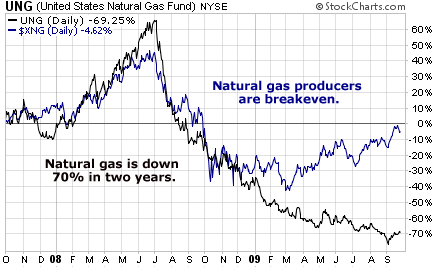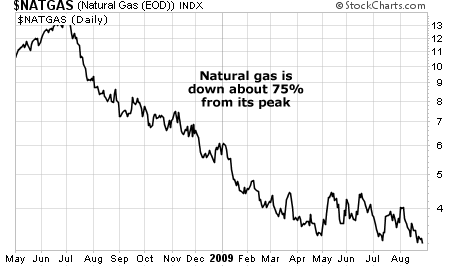By Tom Dyson | 29 September 2009
Investors in natural gas stocks have lost their minds. They're about to lose their wallets, too… There's a major wipeout coming in the natural gas business. North America has too many natural gas producers. The industry needs a major cleaning out. The most inefficient, high-cost producers must fold. This will bring supply and demand back into balance.
Low prices are the market's mechanism for culling the weak players. Four weeks ago, natural gas prices hit a seven-year low of $2.50 per thousand cubic feet. But so far, nothing's happened. No player wants to cut production when they've invested so much money developing it [[and must continue to pay the interest on their loans: normxxx]]. "Getting $3 is better than nothing," they think. [[Where $3 mcf, m = 1000, is about break even. : normxxx]] "Better to pump out more now before it falls even farther."
In the last four weeks, the spot price for nat gas has jumped above $4 [[and the nearby futures contract is selling about $1 higher : normxxx]]and is [now hovering around there]. With higher prices, production is growing even more. According to industry researcher Baker Hughes, the number of rigs drilling for natural gas in the United States has gained in nine of the last 10 weeks. Meanwhile, the oversupply of gas is so great, we've almost run out of room to store it.
The Energy Information Administration says U.S. natural gas inventories rose again last week. They are now a just a chip shot from the record high hit in November 2007. Natural gas storage in producing regions— including Texas, Louisiana, and Oklahoma— already reached a record high last month.
Aubrey McClendon, CEO of Chesapeake Energy, the largest independent gas producer in America, figures America's natural gas industry will fill up all available storage by the end of the year. There'll be "involuntary curtailments," he says. This chart compares UNG, the exchange-traded fund (ETF) for natural gas (in black), with XNG, the AMEX index of natural gas producers (in blue). XNG is an index of natural gas producers like Chesapeake, Devon, Anadarko, and Apache.

In the last two years, the price of natural gas has fallen almost 70%, yet natural gas stocks are still trading at almost the same prices. In other words, investors in natural gas stocks have totally ignored the huge collapse in natural gas prices. And get this… This next chart shows the AMEX oil producer index (in black) cast against the AMEX natural gas producer index (in blue). The AMEX oil producer index contains names like ConocoPhillips, Chevron, and Hess.

Natural gas stocks have thrashed oil stocks over the last nine months, even though the price of oil gained 60% over this time, while the price of natural gas lost 13%. The guillotine is about to fall on natural gas production. And I can't see any reason for this strength in natural gas stocks. My only conclusion: Investors in natural gas stocks are living in la-la land The dream ends when storage runs out and gas prices plunge.
Aggressive traders should immediately short high-cost, speculative natural gas stocks. Conservative investors should wait for the storm to pass. They'll be able to pick up the highest-quality producers at bargain prices. I expect some of these companies will be paying 20%-30% dividend yields in the aftermath.
I'll let you know when the time comes…
Good investing,
.
We're Headed For A Huge Wipeout In Natural Gas
By Tom Dyson | 31 August 2009
Natural gas is plummeting… Last week, natural gas fell to a fresh seven-year low… trading as low as $2.70 per mcf (that's 1,000 cubic feet).

The big fall came on Thursday after a report by the Energy Information Administration (EIA) showed natural gas producers had put another 54 million mcf of gas in storage last week. There's now over 3 billion mcf of gas in storage in America. Here's the thing: I just read a transcript of the latest earnings conference call from Chesapeake Energy. Chesapeake is the largest independent natural gas producer in America.
One analyst asked Aubrey McClendon, Chesapeake's CEO, why he ramped up production recently even though gas prices had fallen so far. Normally, you'd expect the opposite. When you can't make a profit, you cut production to the bone.
McClendon said America's natural gas industry will have filled up all available storage by the end of the year. At this point, there'll be "involuntary curtailments". In a few months, the lack of storage will force gas companies to stop pumping gas.
In the meantime, McClendon needs to pump as much gas as he can before the storage caverns fill up. It's like a race to pick up pennies in front of a steamroller. "We didn't see any reason to take it on the chin for the team," he concluded.
Over the last few years, the gas industry has borrowed billions of dollars and used this money to develop new gas fields. Natural gas companies have built refineries, ports, pipelines, drilling rigs, platforms, and storage tanks. Even though the industry isn't making any money pumping natural gas at prices below $3 per mcf, it cannot cut production. These companies have to make interest payments and must earn whatever revenue they can get.
In other words, gas prices are falling because the industry keeps producing as much gas as it can, even though there isn't enough demand. For now, this hasn't been a showstopper. The U.S. has a huge capacity for storing natural gas. The trouble is, that storage is almost full…
When the storage fills to capacity, there's going to be a storm in the natural gas industry. Many companies will be forced to turn off the spigots. Can you imagine what will happen to earnings at these companies? They'll collapse. How will these companies pay the interest on their debts?
Gas is cheap, it's clean, and it's made in America. Gas has a great future. But until the storage runs out and half the producing companies go bankrupt, gas prices won't rise. There'll be too much supply. Shorting overleveraged, high-cost gas producers is the way to profit from this situation. Many of these companies are going bankrupt in the very near future.
Good investing,
Tom
P.S. The EIA is publishing a report on the amount of natural gas storage still left in America. This report comes out in the next few weeks. I'll let you know when they publish it… and what its implications are. Keep reading.
No comments:
Post a Comment